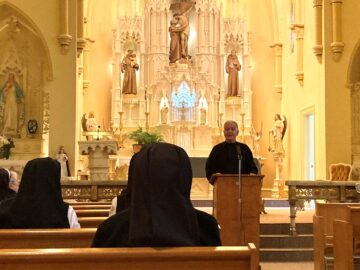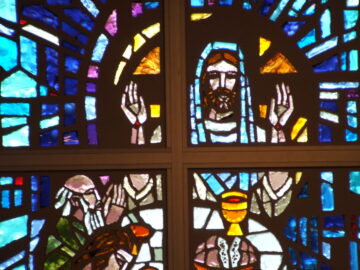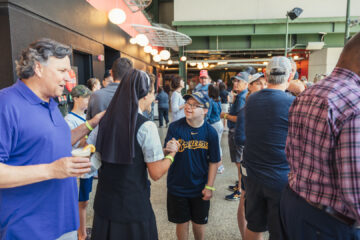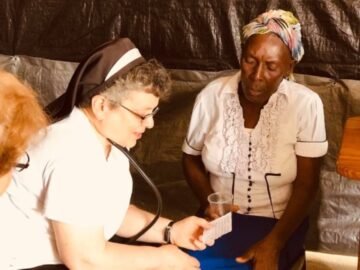Keeping in mind St. Francis of Assisi’s call to “Rebuild My Church’, Franciscan Sisters of Christian Charity invite Fr. Jack Conley CP to reflect on “Real Presence”. Father serves as Director of Ministry at Christ the King Passionist Retreat Center, Citrus Heights, California, a ministry of the Passionists of the Holy Cross Province.
 In his first encyclical, Ad Petri Cathedram, Pope St. John XXIII quoted a famous maxim that eventually reappeared in #92 of the Vatican II Document, Church in the Modern World: “In necessariis, unitas… in dubiis, libertas… in omnibus, caritas.” Unity in what is essential, freedom in matters of doubt, and charity in all things.”
In his first encyclical, Ad Petri Cathedram, Pope St. John XXIII quoted a famous maxim that eventually reappeared in #92 of the Vatican II Document, Church in the Modern World: “In necessariis, unitas… in dubiis, libertas… in omnibus, caritas.” Unity in what is essential, freedom in matters of doubt, and charity in all things.”
Throughout the history of the Church, in the sacred times of renewal and reform, these words have a particular relevance… unity, freedom, charity. And today, as we ponder the grace of the Synod on Synodality and the Campaign for Eucharistic Revival, the same words could offer us guidance.
Whether we are speaking of Church reform, Eucharist, or the Synod, we are again reminded of the invitation — the challenge — from the prophet, Isaiah, as well: “Enlarge the space for your tent” (Isaiah 54:2). In this age of cultural and ecclesial polarization, we find ourselves hearing the words that St. Francis heard, but in a new light, “GO, REBUILD MY CHURCH”! Unity, freedom, charity.
Significantly, the only miracle found in all four gospels is one involving food: the story of Jesus’ feeding the multitudes (Mk 6:34-44, Mt 14:13-21, Lk 9:10b-17, Jn 6:1-15). It is obvious that the evangelists, each in his own way, saw a link between the miraculous feeding of the multitudes and the traditions of Christian Eucharist (“took, blessed, broke, shared” language that is clearly liturgical). It seems that the purpose of the juxtaposition of the feeding miracle and the eucharist is a maneuver to shake the listener up, pull us out of our pseudo piety, our comfort zones, into the multi-faceted mystery of REAL PRESENCE.
Gospel stories challenge Christians to remember that eucharistic origins lay not merely in Jesus’ last meal, but in all those events wherein Jesus (as guest or host) satisfied hunger, announced the unbridled joy of God’s arrival in present moment, and offered healing and hope to the poor and needy.
Similar challenge occurs in stories like that of the anointing at Bethany (Mk 14:3-9). Here we are again confronted with an outrageous and extravagant situation: a woman clutching an alabaster jar… taking, breaking, giving language. Command: to repeat, to be repeated wherever the gospel is proclaimed… in memory of her. Real Presence. Go, rebuild my Church. Unity, freedom, charity.
This narrative manifests our “all too much God,” … a God of abundance, not scarcity, as Scripture scholar Walter Brueggemann labels it. This “over-the-top” extravagance is mirrored in the plentifulness of
- wine at Cana,
- fish sinking boats,
- a prodigal father (with two ungrateful sons!)
Is God too generous? Too inclusive?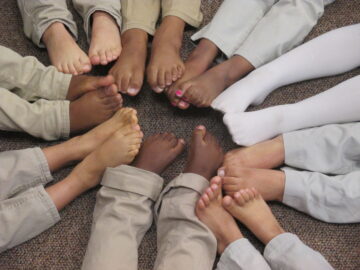
As history unfolded, however, attention shifted from Jesus’ focus on open companionship at the table, a meal practice of radical generosity and inclusivity (Cardinal Robert McElroy recently wrote of this and was severely criticized!) and “over-the-top” abundance (Why else would Jesus say that tax collectors and prostitutes are in this communion before scribes and Pharisees?) gave way to a cultic practice with greater focus on the bread and wine alone.
We must be careful that we do not objectify the Eucharist for our comfort and ease. Liturgical theologian Nathan Mitchell, in his book, Real Presence, writes that for Jesus, the focus is not what’s on the table, but who’s at the table. While sometimes today we hear of the adage, WWJD — What Would Jesus Do? perhaps good Pope John might also offer wisdom and direction here: UNITY, FREEDOM, CHARITY.

